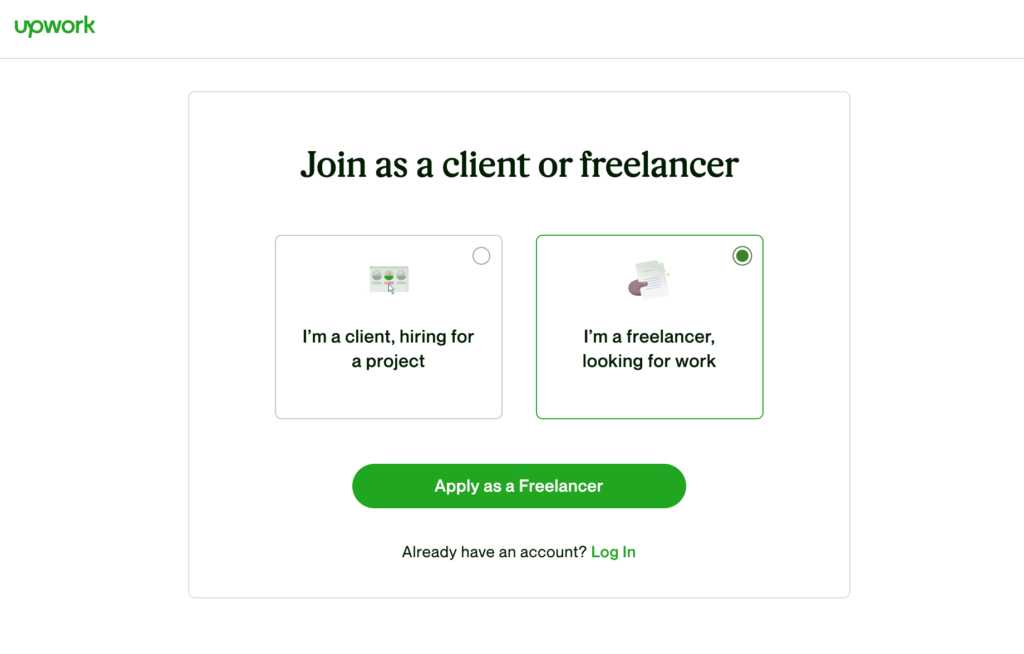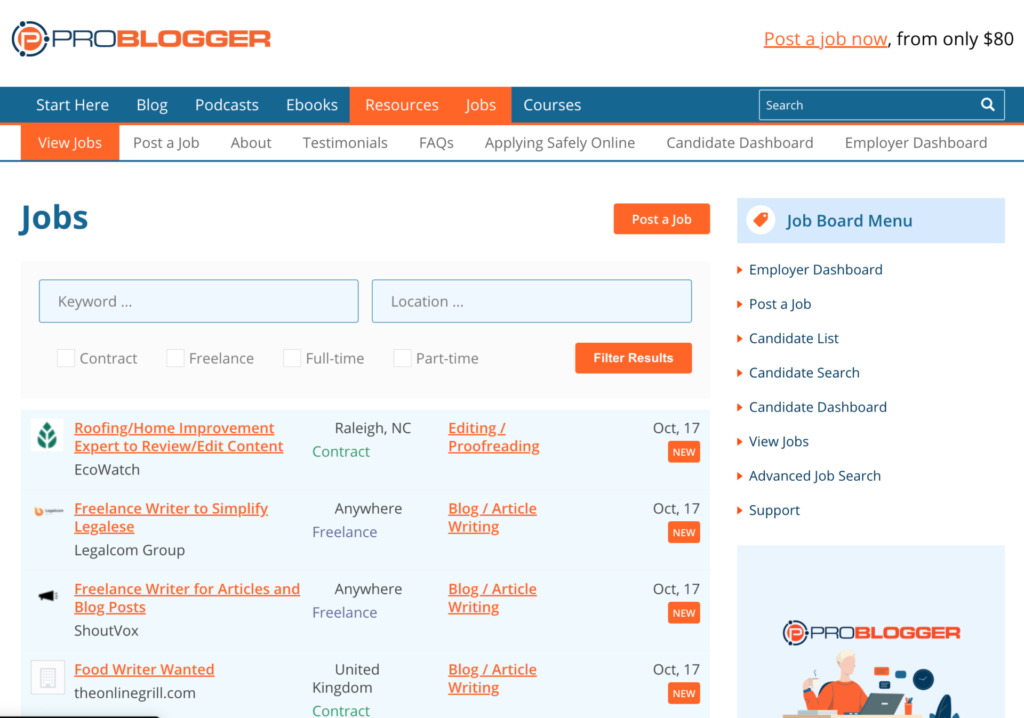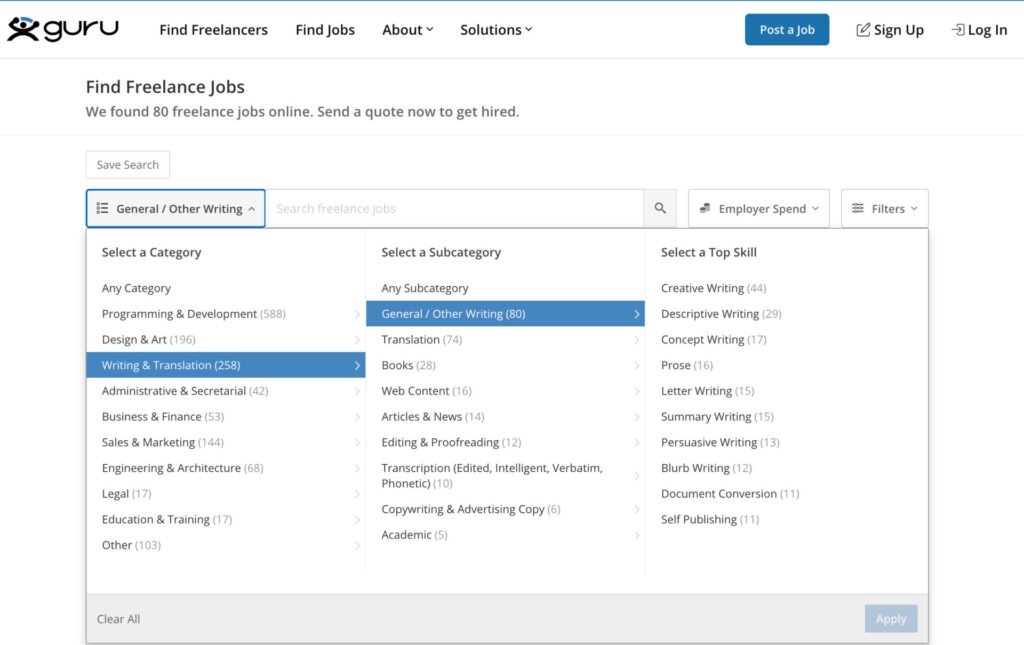If you want to grow your freelance writing income, finding a reliable way to get jobs is crucial. One option is to join a freelance marketplace like Upwork, which you’ve probably heard a lot of mixed messages about. Some freelance writers claim Upwork transformed their business and helped them become six-figure earners, others say it’s a race to the bottom. So who’s right? Is Upwork worth your precious time, or are your efforts better spent elsewhere? This in-depth Upwork review is designed to help you decide.
Here, we’ll break down how the platform works and will shine a light on its pros and cons. You’ll hear from real freelance writers about their experience on the platform and get their unfiltered opinions. Plus, learn how much freelancers can make on Upwork, how much it costs, and more.
Let’s dive in!
Want to jump ahead?
Upwork review table of contents
- What is Upwork?
- How Upwork works for freelancers
- How much does Upwork cost for freelance writers?
- How much can you make on Upwork?
- Upwork pros and cons
- What real freelance writers say about getting jobs on Upwork
- Is Upwork worth it for freelance writers?
- How does Upwork compare to other freelancing platforms?
- Frequently asked questions about Upwork for freelance writers
What is Upwork?

Upwork is an online marketplace for contract jobs that freelancers can use to find clients. More than 10,0000 freelance gigs across a dozen different industries are posted on Upwork daily, including numerous writing projects. Whether you specialize in copy, content, or even creative writing — you’ll be able to find lots of job opportunities that suit your skills.
Believe it or not, Upwork began over two decades ago, making it one of the oldest freelancing platforms out there. It’s also one of the biggest companies of its kind, with over 771,000 active clients and $503 million in revenue as of 2021.
Freelancers earned more than $3.3 billion on Upwork last year alone, so there’s a lot of money to be made on the platform. To help you figure out if Upwork is the right place to build your freelance writing career, here’s some more info about how the marketplace works for freelance writers.
How Upwork works for freelance writers
Upwork allows you to apply for jobs, get hired, communicate with clients, submit work, and send invoices all in one convenient place. Because the platform is so user-friendly, getting started is a pretty straightforward process:
1. Sign up

Sign up using your email, Google, or Apple account, and fill out a few personal details including your location and full name. Remember to check the box that indicates you’re a freelancer so you get the right type of account.
2. Complete your profile
Complete your profile by uploading a photo of yourself, writing a professional bio, and describing your experience, education, and skills (writing and relevant non-writing). You’ll also need to confirm your identity by providing a valid government-issued ID and undergoing visual verification.
3. Browse jobs (can apply filters)

After your profile gets verified, you’re ready to start browsing jobs! You can narrow down your search by using keywords and filters to sort the gigs, including project length, rate, experience level, and contract type.
There are two kinds of contracts you’ll come across on Upwork — hourly and fixed-price. Hourly contracts are billed by the hour, whereas fixed-price contracts pay one flat fee for the entire project. Fixed-price contracts are often broken down into stages called milestones so clients can check-in and review your work periodically.
Job listings usually include a short description of the role, some info about the client, and an overview of the skills and experience you’ll need to be successful. Make sure you review these details carefully to make sure the job is a good fit because applying costs money.
4. Apply
Once you find a job that catches your eye, the next step is to submit a proposal that includes your hourly rate, cover letter, writing samples, and answers to the client’s screening questions. Submitting a proposal usually costs between one and six connects, which are virtual tokens you can purchase for $0.15 each. Quick gigs are cheaper to apply for, while larger projects with bigger budgets require more connects.
5. Talk with potential clients
If a client likes your proposal and profile, they’ll message you to discuss the project further. Some clients may also want to schedule a video or phone interview through Upwork’s Zoom feature. Keep in mind that it’s against Upwork’s terms of service to share your contact information with a client before starting a contract, so keep all communication on the platform until you’re hired.
6. Get projects
When a client decides to hire you, they’ll send you an offer that outlines all the details of the project, such as the scope of work, payment terms, and deadlines, including any milestones for fixed-price contracts. You can request changes to the contract or accept the offer as-is. Once you reach an agreement, the client will deposit the funds for the first milestone in an escrow account or verify their payment method so work can begin.
7. Complete and submit work
Now it’s time to get to work! Here’s how the process usually goes. For fixed-price projects, you’ll complete each milestone one at a time, making sure to submit it by the agreed-upon deadline. Your client will have 14 days to approve the work you did or request changes.
If you’re an hourly worker, you can either log the time you spend on the project using Upwork’s time tracker, or add your hours to your work diary manually. Keep in mind that the hours you enter yourself aren’t eligible for payment protection, which could cause you to lose money if your client disputes your work diary. Once you complete the project, you can send the files to the client for review using Upwork’s message center or another method like email.
8. Get paid
Payments work differently depending on which type of contract you have. Hourly workers get paid on a weekly billing cycle that ends on Sundays. However, you won’t be able to withdraw the funds until they’re fully processed, which usually takes 10 days.
If you’re working on a fixed-price project, you’ll get paid after each milestone is approved by your client. Then, you’ll be able to withdraw your funds after a 5-day security hold. If your client doesn’t respond to your milestone submission within two weeks, Upwork will automatically release your payment.
9. Earn reviews
Once the contract ends, your client will have a chance to leave you a review on your profile and vice versa. These reviews are public and usually include written feedback plus a star rating ranging from one to five.
10. Build reputability/social proof
Doing excellent work consistently, and earning 5-star reviews from clients, will help you build a reputation as a top writer in your niche. Then, you can use your Upwork profile as a form of social proof when you apply for jobs both on and off the platform.
11. Get invites

Once you prove that you can do top-notch work, Upwork will start recommending your profile to clients. If they’re impressed with your skills and experience, they’ll send you inbound job invites that don’t cost you anything to apply.
How much does Upwork cost for freelance writers?

Unfortunately, there’s no such thing as a free lunch. Gaining access to one of the world’s largest freelancing platforms costs money. Here’s how much freelance writers have to pay to use Upwork.
Connects
Connects are virtual tokens that are required to apply for jobs on Upwork. They cost $0.15 each and can be purchased in bundles of 10, 20, 40, 60, or 80. To reduce the cost of submitting proposals, Upwork gives freelancers complimentary connects every month — 10 if you have a free account and 80 if you’re a Freelancer Plus member. You’ll also get free connects when you sign up, win interviews, and earn certain talent badges and skill certifications.
Membership plans
Freelancer Plus is an optional membership plan that you can purchase for $14.99 per month. It comes with perks like higher profile visibility, more free connects, and the ability to view other bids on jobs (which may help you land more gigs).
Project fees
Whether you decide to stick with a free account or upgrade to a paid one, you’ll still be charged project fees on the jobs you complete. Upwork takes a flat percentage of your earnings from each client that decreases the longer you work together.
Effective May 3, 2023:
- A 10% fee is applied to all of your invoiced earnings (hourly, fixed, or a project catalog).
Before May 3, 2023:
- A 20% fee is applied to the first $500 a new customer pays you.
- On any further payments from the same client, you’ll be charged a 10% fee — unless you hit $10,000 in earnings over the course of your working relationship.
- After $10,000 in earnings, the fee charged on projects for that customer decreases to just 5%. This fee structure rewards you for getting repeat business.
Conversion fees
If a client wants to offer you a full-time job or take the relationship off-platform for any reason, Upwork may charge a conversion fee. This conversion fee is usually equal to 13.5% of your projected earnings over the next 12 months. Upwork uses the formula below to estimate your earnings:
13.5% of a freelancer’s hourly rate x 2,080 hours (52 weeks x 40 hours) = conversion fee
- If you’ve been working on an hourly contract, Upwork will plug the highest hourly rate you charged your client into the formula.
- For fixed-price contracts, Upwork will use the hourly rate listed on your profile. Either you or your client can pay the conversion fee if it applies.
However, there are a few exceptions that may exempt you from paying it altogether. If you met and started working with your client outside of Upwork, you won’t owe anything for taking the relationship back off-platform. Additionally, a customer you’ve worked with for at least two years only has to pay a dollar to collaborate with you elsewhere.
How much can you make on Upwork?

According to Upwork, 60% of people who left a full-time position to freelance earn more now through self-employment than they did at their 9-to-5 job. But can you really make more money writing from your couch than working in an office?
It’s hard to predict exactly how much money you’ll be able to earn on Upwork. The amount of success you’ll have on the platform depends on factors like your experience level, the strength of your profile, and your niche. Several of the writers we talked to who specialize in lucrative niches such as tech and finance are able to command up to $125 per hour on Upwork.
However, on average, the median annual salary for self-employed writers is about $42,000, which shakes out to $30 or $40 an hour. Keep in mind that you may need to start out at a lower rate to win your first jobs and build up to a higher hourly wage over time.
Upwork review: Pros and cons
Upwork is a great place to advertise your services to clients and make money, but it’s not without its drawbacks. Here’s a rundown of the platform’s main pros and cons.
Upwork pros
- Find a large pool of writing jobs on offer: You can find thousands of writing jobs across every niche on Upwork. Whether you specialize in finance copywriting, creative writing, or something else entirely, Upwork has gigs that match your skill set.
- Gain payment protection: 74% of freelancers have had issues with clients not paying invoices, so the payment protection Upwork offers is a big perk. Payment is verified or goes into escrow before work begins, which helps ensure you get compensated for your efforts.
- Build a profile of reviews for social proof: Many freelancers are hesitant to ask for testimonials. Upwork automatically prompts both parties to leave feedback at the end of every project. This makes it easier for freelancers to gain positive reviews and build social proof.
- Get project invites: Every freelancer dreams of getting to a point in their career where customers come to them. Once your profile gains enough traction, Upwork will deliver inbound leads straight to your inbox. This reduces the amount of time and connects you have to spend applying for gigs.
- Project management infrastructure: Remote collaboration can be difficult, but Upwork’s project management infrastructure makes it easier. The message center has tools to help you communicate with clients like file and document sharing, a Zoom integration for audio and video calls, a scratchpad for notes, and a screen recording service.
- Fraud team vetting clients: Upwork has a fraud detection team that watches out for suspicious or inappropriate activity such as threats, harassment, scams, and requests for free work. Their oversight helps keep clients and freelancers with bad intentions off the platform, creating a safer experience for everyone.
- Fees decrease as client earnings increase: Project fees for new clients start off at 20%. However, they decrease to 10% after the first $500 in earnings and drop to 5% when you hit $10,000. This incentivizes you to go after long-term contracts instead of small one-off jobs, which can help you build a predictable, sustainable freelancing income.
Upwork cons
- Project fees: Although Upwork’s project fees decrease over time, they’ll still take a significant chunk out of your earnings. Consider raising your hourly rate to help offset the cost of project fees.
- Connect fees: Although joining Upwork is free, applying for gigs isn’t. You’ll have to pay between $0.15 and $0.90 every time you submit a proposal, which adds up and detracts from your profits.
- Lots of competition for jobs: Upwork is a global marketplace with freelancers in more than 180 countries, including the United Kingdom, Canada, Australia, India, and Germany. This means you’re competing with freelancers from all over the world for jobs. In order to attract clients, you’ll have to find ways to differentiate yourself and stand out from the pack.
- Many lower-paying gigs: On online marketplaces like Upwork, many freelancers try to compete with each other on price, lowering their rates in hopes of winning the job. This trains clients to expect bargain prices, which results in many low-paying gigs getting posted. Although there are clients on Upwork who are willing to pay a premium for quality work, you’ll have to do some digging to find them.
- Fees for taking relationships off-platform: Upwork may require you to pay a hefty conversion fee to take certain client relationships off-platform, which can make it harder to grow your freelance career. If you break any of Upwork’s strict rules about off-platform relationships and communication, your account could get suspended.
- Payment holding periods: If you need fast cash to pay a bill, Upwork probably isn’t the best solution. Payments for fixed-price projects aren’t available for withdrawal for 5 days. Earnings from hourly contracts take even longer to process—about 10 days on average.
What are real freelance writers saying about Upwork?

What are real freelance writers saying after trying out Upwork? There are mixed reviews…
It’s becoming unaffordable
“I’m a freelance writer, well-established in Upwork. To me, the issue is that it, and similar sites are becoming unaffordable. Upwork takes 20% of your fee (10% for repeat clients) upfront. They insist that, on pain of banishment, you use them to receive the fee. They then hold onto it for a week before allowing you to withdraw it.
Finally, before submitting proposals, you must buy “contacts” from them, which are consumed irrespective of whether the proposal was successful or not. True, you get 10 free a month, which covers one, or possibly two proposals.
By the time I have moved the fee to PayPal, then down to my local South African Bank, I’ve lost about a third of the fee.” –Iain Robertson, freelance writer.
Profitable channel but requires persistence
“I’m actually close to $200K in lifetime earnings on Upwork. There are lowballers, but there are also a lot of great clients who don’t know where to look for freelancers. Like finding clients anywhere, it just takes a bit of persistence. The more 5-star reviews you can get, the easier it is to find higher-quality clients. I definitely recommend it, especially for new writers and during slow times.” Kayly Lange, freelance writer for SaaS and tech companies.
Best source of work!
“I’m trying to expand beyond Upwork, but it’s still my best source of work. I get invited to jobs that pay my rates (which are not low) fairly regularly, and the clients are extremely professional and pleasant to work with,” says Sarah Barbour, freelance finance writer.
When asked what’s working well, Sarah says, “Most of the work I’ve gotten recently has been through invitations, but I still apply for good jobs when I see them. My theory is that staying active on the platform keeps the algorithms happy and helps you get found more easily (but that’s just a theory). I have good reviews, and I’ve raised my rates consistently. I started at $30/hr in March 2021 and now charge $125/hr as of about 2 months ago.”
Good if you can get into the private talent clouds
“It got a lot harder once they rolled out the private talent clouds. I was lucky enough to be on the radar of my target market before that and was added to some by Upwork and others by the clients themselves. If you’re targeting major players, their recruiters and content teams can add you to these directly to see postings,” says Geoff Whiting, senior copywriter at Red Stag Fulfillment.
Too many lowball offers
“I actually stopped looking for freelance work on Upwork. Kept having to sort through lowball offers. It might be different for those who’ve written for longer,” says Michelle Harris, freelance writer.
Mostly a race to the bottom
“There is some quality business on these freelance marketplaces. But most of the time it is the race to the bottom to find the writer with the lowest rates,” says Azrung Fayaz MD, freelance health writer.
Prefers LinkedIn
“Personally never had luck getting any from Upwork or any of those platforms. LinkedIn is the way to go for me! I’ve found the quality of clients is much better on here, too 🙂,” says Sharon Wu, freelance content writer.
Staying Active on the Platform Can Pay Off
“Bravo to the person who said that staying active on the platform keeps the algorithm happy. I applied for a few jobs recently. I didn’t get a single job from those proposals ?. But I started receiving many invitations. I have received 40+ invitations this month leading to projects worth $3000+ (I took 3 projects only),” says Kishmala Islam, a scientific researcher.
She adds, “It took me 7 years to reach the top 1% as a scientific researcher but it’s so worth it. Every business needs investment in the form of time and money, so if you don’t have money, invest your time.”
Upwork review verdict: Is it worth it for freelance writers?
In this day and age, there are lots of ways for writers to advertise their services and make money, so is Upwork worth your time?
Using Upwork can be a good way to expand your client base since there are so many gigs posted every day. But standing out on a globalized platform with experienced freelancers from all over the world can be difficult, especially if you’re a new writer. Expect it to take some time and effort to build up your profile and reputation enough to attract quality clients. To get established on the platform, you might have to pay your dues and take some low-paying gigs.
However, once you prove your value and skills, you can earn good money on Upwork. Some of the writers we spoke to are pulling in up to $125 per hour. Just make sure you factor the project and connect fees you’ll have to pay to use the platform into your hourly rate. Charging a bit more will prevent you from feeling short-changed after Upwork takes its cut.
How does Upwork compare to other freelancing platforms?
Upwork isn’t the only platform you can use to find freelance writing jobs. Let’s take a look at some other popular freelance marketplaces and see how they stack up.
Upwork vs ProBlogger
Problogger is a forum-style job board that mainly features freelance blog and article writing opportunities. Most jobs are geared toward entry and mid-level writers with pay rates ranging from $0.05 to $0.15 per word. Only a handful of jobs get posted every day, so there are far fewer opportunities on Problogger than on Upwork.

On the upside, you don’t have to pay anything to apply to Problogger job listings. But the low barrier to entry means there’s lots of competition — each gig gets thousands of views and hundreds of applicants. However, applying to jobs within your niche the same day they’re posted can improve your odds.
Problogger charges clients at least $80 to advertise a job, which helps weed out scams. The board is also regularly monitored for suspicious posts. But because Problogger is just a job board, you won’t get any kind of payment protection, so you may want to ask your clients for a deposit before you begin work.
Further, Problogger lacks the project management infrastructure that Upwork offers. However, since Problogger doesn’t charge any project fees on your earnings, you can invest the money you save into collaboration tools.
Upwork vs iWriter
iWriter is an article-writing service that accepts custom content requests from clients, which its pool of freelancers fulfills. After you sign up and create a free account, you can browse the list of available articles and reserve the ones that interest you.
However, as a new writer, you’ll be locked out of the most desirable projects until you achieve a higher star rating. This means you’ll have to take on very, very low-paying gigs, in the beginning, to build up your reputation.
iWriter says that freelancers only get paid 65% of the price of the blogs they write. So new writers who are working on low-paying entry-level projects may earn as little as $2.15 for a 500-word article. You won’t be able to move up to the next level and earn higher pay until you’ve written at least 25 of these beginner articles, so you’ll be writing for paltry rates for a while.
The highest-status writers on the iWriter can earn $0.05 per word, but it takes a lot of work to get to that point. You’d be better served by putting all that effort into building your reputation on Upwork, where top writers are earning up to $125 per hour.
Upwork vs Guru
Guru is another freelancing platform that’s been around for quite a while — it was founded more than 20 years ago in 1998. The site features a wide variety of job postings from web development to graphic design to translation. However, Guru may not have as many writing opportunities as Upwork. Typing “writing” into Upwork’s job search portal yields thousands of results, but the same search only turns up a couple hundred listings on Guru.

Similar to Upwork, Guru requires you to pay one virtual token (called a bid) to apply for a job. Bids cost around $0.50 each, so they’re a bit more expensive than Upwork connects. But it may be cheaper to apply for high-paying gigs on Guru because they only cost one bid instead of five or six connects.
Guru also tends to have lower fees than Upwork. Freelancers with a basic, free account are charged a 9% project fee on their earnings. However, Guru allows you to split the fee with your client and ask them to cover up to 5% of it. Upgrading your account to one of Guru’s paid membership plans can also reduce the project fees you pay and get you more complimentary bid tokens.
Just like Upwork, Guru offers project management infrastructure and a payment protection feature called SafePay to prevent nonpayment issues. In addition to hourly and fixed-price contracts, Guru allows you to set up a retainer agreement and arrange recurring payments. Although Guru seems to have fewer writing opportunities than Upwork, it may be worth joining for its lower fees and unique payment options.
Upwork vs Fiverr
Is Fiverr or Upwork better for writers? It largely depends on your preferences and work style.
Fiverr is a gig marketplace that allows freelancers to package their services into offers (called “gigs”) and sell them to clients. Instead of applying to writing jobs, you’ll create gigs that describe what you can do for customers, such as crafting a 1,000-word, SEO-optimized finance article for $100 in 3 days.

You don’t have to pay anything to become a seller and post gigs, but Fiverr will charge you a flat 20% fee on all your earnings. Since this fee doesn’t decrease over time, you’ll likely end up paying more fees on Fiverr than on Upwork.
Fiverr allows you to create custom offers for buyers who show interest in your services, which is a good sales tool. You can also create recurring subscriptions for clients who need multiple pieces of content per month and want to make repeat orders. Fiverr even enables you to create milestones within a gig, which makes it possible to complete more complex projects.
A potential drawback of Fiverr is the lack of hourly pricing options—you can only create fixed-price gigs. But if you don’t like tracking your time and would rather work for a flat rate, you may not mind.
Frequently asked questions about Upwork for freelance writers
Still have burning questions? We’ve got answers to the FAQs about Upwork.
Is Upwork a safe site?
Generally, Upwork is a safe site. Upwork has a fraud detection team that removes suspicious jobs from the platform, which helps root out scams. There’s also a payment protection system in place so clients can’t rip freelancers off. However, you’re still on the internet, so remember to practice online safety when using Upwork.
Is Upwork good for beginner freelance writers?
It can be difficult for a new freelancer who doesn’t have writing samples or references to break into Upwork because it’s so competitive. However, if you’re willing to take lower-paying gigs to build up your reputation, Upwork could be a good place to cut your teeth.
The platform has lots of helpful features to guide you through working with clients for the first time, such as payment protection and automatic invoicing, and contract creation. Using Upwork for your first few projects can help you get your feet wet and learn how to navigate client relationships before you branch out on your own. For more advice as a newbie, check out our blog on how to become a freelance writer in 12 steps.
Does Upwork pay well?
Upwork is a talent marketplace that acts as a middleman between clients and freelancers, so it doesn’t pay writers. However, Upwork has hundreds of thousands of active clients who advertise contract jobs on the platform and pay amounts across the spectrum, from minimum wage to $100+ per hour.
What if you want to look beyond Upwork? Check out 25 legit ways to find freelance writing jobs—all recommended by real writers!


